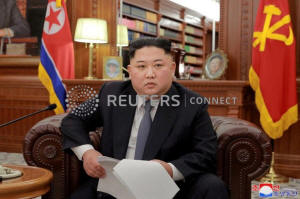|
North Korea warns of 'new path', but
options limited
 Send a link to a friend
Send a link to a friend
 [January 02, 2019]
By Hyonhee Shin [January 02, 2019]
By Hyonhee Shin
SEOUL (Reuters) - In his New Year address
on Tuesday, North Korean leader Kim Jong Un warned he might take a "new
path" if Washington maintains sanctions amid his country's push for
economic development, but experts say it may be too late to change the
trajectory of negotiations.
Kim did not specify what the new approach might be. His warning may
sound similar to the bellicose rhetoric that Pyongyang often deployed
before last year's summit, but he cannot jeopardize the hard-won thaw
and has few options beyond appealing directly to U.S. President Donald
Trump, experts say.
State media have in recent weeks accused the State Department of risking
returning to "exchanges of fire" of the past by ramping up sanctions,
while crediting Trump for his efforts to continue talks.
As both sides struggle to find a breakthrough in stalled talks, the
speech shows Kim shifting the focus from calls for complete
dismantlement of its nuclear arsenal and hinting at including countries
other than the United States.

Q: IS THIS A SIGN OF FRUSTRATION?
A: Kim vowed to work towards denuclearization at a summit with Trump in
Singapore in June. But since then there has been little progress, with a
high-level meeting between the two sides canceled abruptly in November.
Pyongyang has demanded Washington lift sanctions and declare a formal
end to the 1950-53 Korean War in response to the dismantlement of its
Punggye-ri nuclear testing site and a key missile engine facility.
Despite goodwill responses from Washington, such as a halt of some major
military exercises with South Korea, U.S. officials have said North
Korea's initial steps were not confirmed and could be easily reversed.
U.S. Vice President Mike Pence said North Korea would not be forced to
provide a list of nuclear weapons and locations, and a U.S. nuclear
envoy offered to facilitate humanitarian aid.
But Kim's speech on Tuesday called for a "complete end" to all joint
exercises and slammed the sanctions campaign.
"His message was 'we have done what we said we would at Singapore, but
the United States has done very little in return,'" said Vipin Narang, a
political scientist at the Massachusetts Institute of Technology.
Q: WHAT DOES 'NEW PATH' MEAN?
A: North Korea's state media has stepped up criticism of the United
States, warning of a return to the era of confrontation if sanctions and
pressure continued. But that indicates Pyongyang's frustration rather
than the "new path" Kim suggested, experts say.
"His speech chiefly emphasized the need for a fair deal, and it's
extremely unlikely for them to go back," said Cheong Seong-chang, a
senior fellow at South Korea's Sejong Institute.
[to top of second column]
|

North Korean leader Kim Jong Un poses for photos in Pyongyang in
this January 1, 2019 photo released by North Korea's Korean Central
News Agency (KCNA). KCNA/via REUTERS/File Photo

Instead, "new path" may refer to focusing on concessions that don't
involve broad denuclearization in favor of action-for-action
commitments.
South Korea's Unification Ministry said on Wednesday it could not
speculate on what the alternative path might be, but Kim showed his
"clear resolve" to abandon the weapons program and improve U.S. ties
by mentioning "complete denuclearization" himself for the first
time.
Kim Joon-hyung, a professor of international politics at Handong
Global University, said one possible scenario was the North's
dismantling of the Yongbyon nuclear complex, as offered at an
inter-Korean summit in September in Pyongyang, and acknowledging
some facilities in return for eased sanctions, such as a partial
restart of inter-Korean economic projects.
Kim Jong Un said in the speech he was willing to reopen the Kaesong
factory park and allow access to the North's Mount Kumgang resort
"without conditions."
Yet there remains an opportunity to limit Kim's arsenal, Narang
said.
"The United States should find out what the price for a cap on North
Korea's nuclear program would be, as it would be an important and
realistic objective," he said.
Q: DOES NORTH KOREA WANT TO SHIFT ITS FOCUS FROM AMERICA?
A: The New Year address called for a launch of multilateral talks to
officially declare an end to the Korean War, an idea also floated
previously by South Korea.
That could mean working with China, South Korea and others in
pressing Washington, professor Kim said. But other experts,
including former South Korean nuclear envoy Lee Soo-hyuk, were
skeptical that would happen given the deadlocked bilateral talks,
the Sino-U.S. trade war and Trump's dislike for multinational
mechanisms.

"This will not be easy, and neither side will achieve outright
success, but diplomacy is possible," said Patrick Cronin, chair for
Asia-Pacific security at the Hudson Institute in New York. "China
and others may also be invited to play a role."
(Reporting by Hyonhee Shin; Additional reporting by Joyce Lee in
SEOUL and David Brunnstrom in Washington; Editing by Gerry Doyle)
[© 2019 Thomson Reuters. All rights
reserved.]
Copyright 2019 Reuters. All rights reserved. This material may not be published,
broadcast, rewritten or redistributed.
Thompson Reuters is solely responsible for this content. |